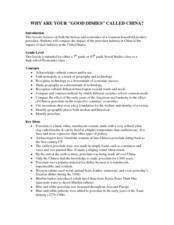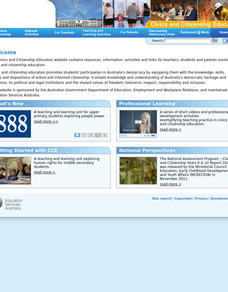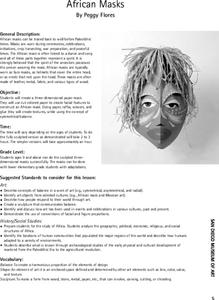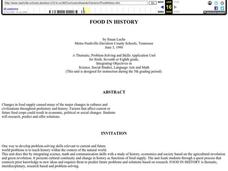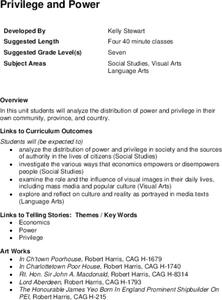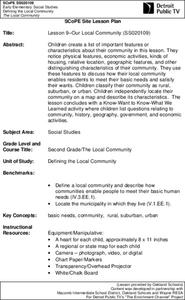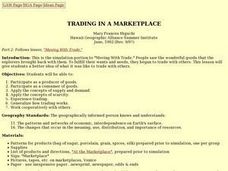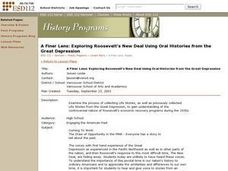Curated OER
Why Are Your "Good Dishes" Called China?
Students link monopoly as a result of geography and technology. They recognize technology as a determinant of economic success. Students recognize cultural diffusion based upon societal wants and needs. They compare and contrast methods...
Curated OER
The Power of Compounding
Sixth graders examine the concept of compounding interest on invested money. They explore how much interest their money would earn through compounded interest. Students conclude that they should invest early and often.
Curated OER
Responsibilities and rights: Making civic decisions
Students, working in small groups, investigate concepts related to social and economic decision-making. They define issues for some different groups within Australia, then assign either government or individual responsibility for each...
Curated OER
African Masks
Fourth graders create three-dimensional paper African masks. They analyze the geographic, political, economic, religious, and social structures of Africa. they discover that masks were worn for various ceremonies.
Curated OER
Pure Land Buddhism in China And Japan
Young scholars investigate the Pure Land sect of Buddhism in an attempt to better understand how Buddhism has adapted itself to fit into the constantly changing
religious, cultural, political, and economic climates of China and Japan.
Curated OER
What is Migration
Students conduct individual research and participate in discussion be able to identify difference between forced and voluntary migration. They identify if push and pull factors are caused by political, social, economic, or environmental...
Curated OER
USH Test One
Eleventh graders write about one reason immigrants came to the United States in the late 1800's. They take a test that focuses upon past concepts and then an introduction is given by the teacher for the concepts of Imperialism and The...
Curated OER
In the Chips
Students explain how markets work and the role of prices within markets is an important key to being able to explain and predict economic behavior. In true markets, prices are determined by the interaction of buyers and sellers.
Curated OER
Food in History
Pupils research, predict and offer solutions regarding factors that affect current or future food crops could result in economic, political or social changes.
Curated OER
Privilege and Power
Seventh graders examine the way privilege and power are broken down in their own community. Using a Venn diagram, they compare and contrast Robert Harris' paintings based on these two concepts. They write their own story based on one...
Curated OER
Lesson 9-Our Local Community
Second graders brainstorm and create a list of important features/characteristics that they would want to include in a community setting. They include physical features, economic activities, kinds of housing, etc. This lesson is a...
Curated OER
Building a Healthy City (Final Project)
Students construct a scaled model of a city that provides for the economic and cultural needs of a community while maintaining high quality air and water to protect the public health. They articulate, in a presentation, the locations of...
Curated OER
Tomatoes for Toyotas
Students investigate and become aware of our country's trade relations with East Asia with emphasis placed on Japan. They explore the global affect of technology, production, distribution and consumption as well as exchange and economic...
Curated OER
Ancient History
Middle schoolers investigate the concept of water usage and conservation. The differences between modern and ancient practices are considered. They conduct research into the economic and social characteristics of ancient civilizations...
Curated OER
Costs & Benefits
Pupils reinforce the concept of the true costs being what is given up by doing something -- normally referred to as opportunity costs.
Curated OER
Role of "Outsiders" And Traders in Society
Students examine the Chinese and Japanese conceptions of "insiders" and "outsiders" and how this affects the attitude toward foreign traders from the 6th to the 16th centuries. Lesson extensions are included.
Curated OER
Weather Proverbs
Students investigate various concepts related to weather. They conduct historical research to see how the study of weather originated and the application of the latest technologies in the field. Students summarize the information with...
Curated OER
Discovering the Past/Considering the Future: Lessons from the Eastern Shore
Students study how the Freedmen's Bureau improved the living conditions among blacks on Maryland's Eastern Shore. They examine Social, Political, and Economic improvements and answer questions.
Curated OER
Unit on Globalization and the Environment
Twelfth graders analyze issues affecting ecosystems. They examine the relationships between members of the international comunity. They also examine the concept of sustainable development.
Curated OER
Trading in a Marketplace
Students complete a trade simulation in a marketplace. In the simulation, they role play the role of producer and consumer of goods and apply the concepts of supply and demand. In groups, they discover how an environment can affect the...
Curated OER
Occupation, Use and Settlement of the Smith River
Learners examine the settlement and use of the Smith River area. Using the internet, they research concepts such as the "right of conquest" and "natural rights". In groups, they demonstrate how the land was transferred to the...
Curated OER
Exploring Roosevelt's New Deal Using Oral Histories from the Great Depression
Students examine the process of collecting life stories. They also look at the lives effected by The Great Depression to gain understanding of the controversial economic plan of Roosevelt.
Curated OER
The Middle East
Young scholars (diversity of learners) explore The Middle East in a variety of ways. They cover a diverse section of concepts: geography, economics, research communications skills, both oral and visual. Students write reflections of...
Curated OER
Match the Environment Group with the Correct Sector
Students identify different types of environmental organizations. They connect each organization to one of three economic sectors. They examine how each organization is different in their goals and purposes.
